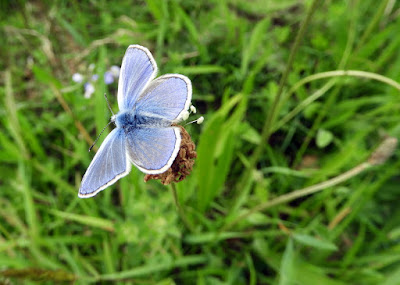A couple of bee species and a few moths from the trap this morning. The above bee was not a lot bigger than an ant and the one below sports a reddish patch on the abdomen that is most noticeable in flight.
In the trap were Common Swift, 3 Cinnabar, Riband Wave, Flame Carpet, Garden Carpet, 2 Common Marbled Carpet, Common Pug, Grey Pug, Oak-tree Pug, Brimstone Moth, Peppered Moth, Willow Beauty, 2 Poplar Hawkmoth, Puss Moth, Swallow Prominent, Pale Tussock, Buff Ermine, 2 Muslin Moth, Cinnabar, Least Black Arches, 2 Heart and Dart, Shuttle-shaped Dart, 3+ Flame Shoulder, 2 Bright-line Brown-eye, 3+ Marbled Minor Agg, Treble Lines, 2 Vine's Rustic and Spectacle. A small number of micros included 3 Diamond-backs - the only immigrant species in the trap.
Red-girdled Mining Bee - thank you to Nick for the identification. This is apparently a scarce and localised species with a preference for sandy soils. It looks like I have a small colony at the back of my garden. They are a small bee and the red band is visible, and distinctive, as they fly low to the ground in small circuits.
Common Blue
Puss Moth
Marbled Minor Agg
Cinnabar
Pale Tussock
Spectacle
Common Swift
Poplar Hawkmoth
Muslin Moth - male
Flame Shoulder
Vine's Rustic
Dark-barred Tortrix - Syndemis musculana
Treble Lines















Good to see you got the moth trap out Matt - nice catch too. The bees have taken me a while to think about. The small one looks like one of the Halictidae - the furrow bees - but there's not enough to ID to species level ... by me at least!
ReplyDeleteThe other one looks to me like Andrena labiata - Red-girdled Mining Bee - but I've done this strictly from the book, not from any personal knowledge, so really not sure. It is meant to be scarce in Southern Britain, so I'm a bit dubious. Is it ok if I download it and tweet it?
Nick
Hi Nick - many thanks for that. It's always magic to put a name to a species. I'm chuffed to have it in the garden as you can imagine. Had a Grey-patched mining Bee yesterday too. All the best. Matt
ReplyDelete